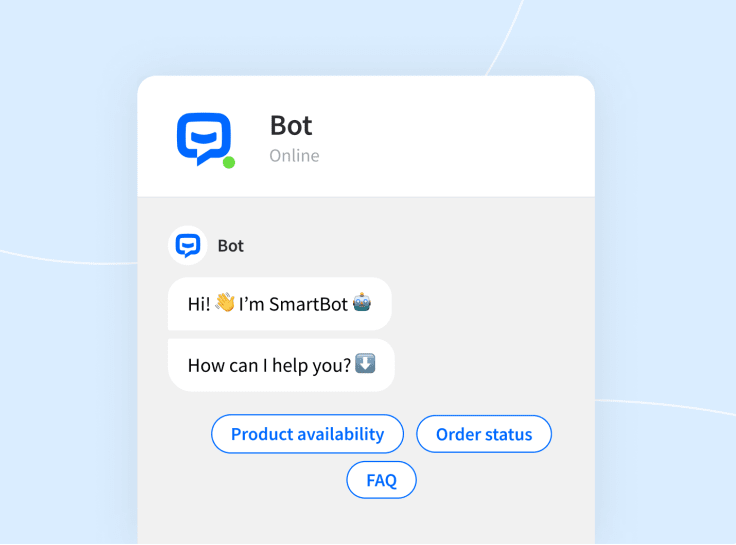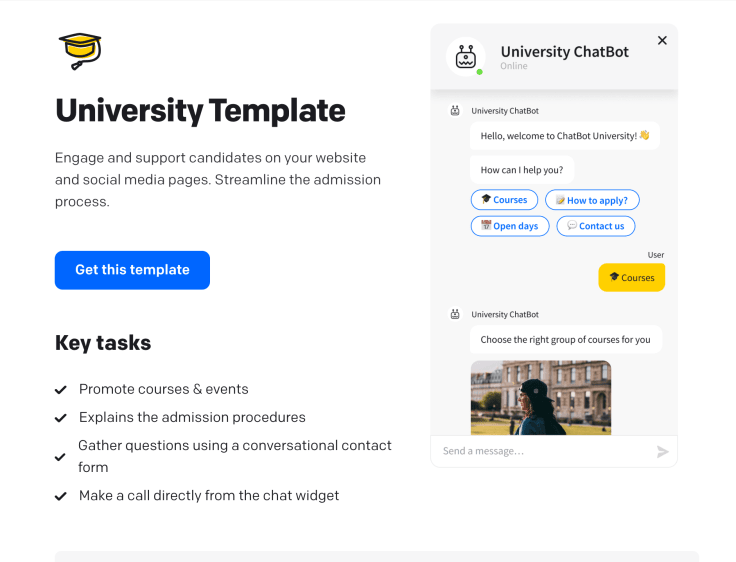Showing top 0 results 0 results found
Showing top 0 results 0 results found

Although we associate school as a place where you must physically show up, the COVID-19 pandemic has challenged this thinking. We realized that the education sector could benefit from digitalization. Online meetings, automated problem-solving for students, and conducting exams through learning platforms are convenient, fast, and essential.
So imagine a world where a student can ask a question to a chatbot that will support them with any problem and guide them through assignments and the complicated systems of a university.
Not convinced? Read on to learn about the benefits of using chatbots for the education industry.
You can try out our ChatBot for FREE for 14 days and explore all the features.
What are educational chatbots?
Educational chatbots are artificial intelligence (AI) applications that aid academic tasks. EdTech firms, universities, schools, and other educational institutions utilize them.
As virtual assistants, these chatbots can contribute to learning by assessing student work, retrieving and managing student data, updating curricula, and improving recruitment processes.
Duolingo is an example of how AI bots can be creatively used to increase student engagement and accelerate conceptual understanding. Educational chatbots are crucial in transforming the learning experience and communication dynamics, offering a comprehensive and efficient solution to various administrative and instructional challenges.
The new online education system
The education sector is undergoing a profound change with the new online education. Leading institutions such as Georgia Tech, Stanford, MIT, and the University of Oxford actively invest in artificial intelligence projects to enhance learning.
Examples include Georgia Tech's adaptive learning platform and Stanford's Artificial Intelligence Lab. Conversational AI is also making its mark, with chatbots becoming commonplace on online platforms to create interactive and engaging learning experiences.
The pandemic has accelerated the integration of online education into the mainstream, with universities offering curricula and flagship distance learning courses.
EdTech companies, using chatbots, are simplifying the lives of students, professors, and administrative departments. In 2019, the education industry was among the top five industries profiting from chatbots, highlighting its proactive approach to technology adoption and its transformative impact on education.
What are the benefits of AI chatbots in the education sector?
There are a lot of benefits in the case of education bots. Let's review a few of them.
Students learning and performance
Global e-learning development is expected to grow at a compound annual growth rate of 9.1% until 2026.
The exponential growth of distance and online courses has made it easier to study alongside work commitments, eliminating the need for long commutes or family interruptions. It enhances the learning experience and boosts performance for many students.
Integrating virtual tutoring and personalized engagement has further enhanced the overall learning experience. Using natural language processing (NLP), chatbots can analyze and evaluate student responses, enabling the delivery of tailored assistance and feedback based on individual progress. This personalized approach fosters the active engagement of students as they interact with the learning bots, creating an environment conducive to effective learning.
Personalization makes a difference everywhere. Whether it’s a fashion store, a Thai restaurant that offers different spice levels, or the education industry. Learn more about personalization thanks to the ChatBot Academy lesson.

Enhanced student engagement through virtual teaching assistants
Increased student engagement through interactions with chatbots results from educational technology developments. Chatbots capture students' attention by fostering interactive conversations, asking thought-provoking questions, providing intriguing information, and turning learning into an adventure.
The personalized interaction created by these AI chatbots develops stronger connections between students and their studies, fostering a sense of immersion and investment in the learning journey.
The research highlights the critical link between student engagement and academic achievement, emphasizing the importance of a positive connection to learning.
Improved administrative efficiency in education systems
Increased administrative efficiency, aided by chatbot automation, has positively impacted bureaucratic processes in the education industry. Using EdTech chatbots has streamlined tedious and repetitive operations, significantly reducing the time and costs associated with administrative tasks.
Chatbots contribute to the organization by responding to student inquiries related to recruitment processes. They provide a user-friendly interface for tasks such as completing digital forms or automatically filling in data collected during interactions. In addition, chatbots manage and update institutional data, contributing to the overall development and administration of the educational institution.
Students benefit from the convenience of interacting with chatbots, eliminating the need to endure long queues and wait times for administrative assistance. Educational chatbots offer a seamless and time-saving alternative, whether seeking information on course details, enrollment procedures, fee structures, financial aid, institutional news, or guides to campus and events.
Cost savings achieved through chatbot-assisted tasks
Chatbots can perform repetitive tasks accurately, freeing up valuable time for teachers and staff.
This, in turn, reduces the need for additional support staff. Chatbots help institutions save on costs and alleviate the burnout experienced by educators and staff overburdened with work. Educational institutions can use chatbots to provide a superior learning experience in a “hands-off” manner, especially with the increased workload and stress levels. Educators can streamline their workload by delegating data-driven repetitive tasks to AI-powered bots, such as tracking student attendance, scoring tests, and distributing assignments.
This optimizes resource allocation and allows teachers to focus on more meaningful aspects of education. The combined effect of cost savings and workload reduction underscores the invaluable role of chatbots in enhancing both the efficiency and well-being of educational institutions.
You can try out our ChatBot for FREE for 14 days and explore all the features.
University Template by ChatBot
ChatBot is a powerful tool designed to improve customer experience. It utilizes advanced AI algorithms that enable it to adapt to any customer conversation and provide personalized customer service.
ChatBot has created a University Template for the education industry, perfect for engaging and supporting candidates on your website and social media and streamlining the admission process.
The university chatbot is designed to assist future applicants in acquiring information about your institution, programs, and courses. It explains the various admission processes and the registration deadlines for submitting applications. Moreover, the chatbot can help promote open days or university events, allowing candidates to submit their applications directly in the chat window. If the candidates need more information about your educational offers, the chatbot enables them to call your department now or leave a message.

Key features:
- Create tickets in the chat window.
- Promote courses & open days.
- Collect applications.
- Make a direct call.
- Educate about your institution.
- Explain the admission procedures.
And now, how can you get this template? It's easy! To access this template, you need to create a ChatBot account. If you're new to ChatBot, use the free 14-day trial period.
The future of AI and chatbots in education
The future of chatbots in education is optimistic, driven by current trends such as natural language processing and machine learning capabilities in advanced tools such as ChatBot.
Learning chatbots have evolved considerably, representing a one-off investment with low maintenance requirements and self-improving algorithms. The development of systems that automatically assess students' level of understanding during learning sessions is a testament to their progress.
If you want to simplify your educational business, try using ChatBot.



